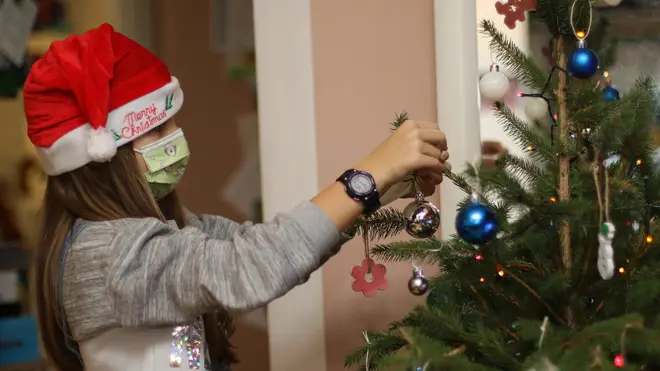
Ali Miraj 12pm - 3pm
16 December 2020, 20:36

Three of Britain's governments have issued a rare joint statement stressing this "cannot be a normal Christmas" due to the coronavirus pandemic.
The UK, Scottish and Welsh governments called on the public to think carefully about forming bubbles between 23 and 27 December but none chose to completely reverse the contentious measure.
It comes following two days of confusion and disagreement between UK leaders on whether or not to keep in place the relaxation of Covid measures over the festive period.
Despite Prime Minister Boris Johnson insisting there was "unanimous agreement" across the four nations, First Ministers Nicola Sturgeon and Mark Drakeford both simultaneously issued statements inconsistent with Westminster's message.
In Wales, Christmas bubbles will be reduced by law to two households, while in Scotland the SNP leader said it was her "strong recommendation" that people remain in their own household over Christmas.
It comes after a stark warning from both the Health Service Journal and British Medical Journal over the "rash decision" to ease Covid rules over Christmas.
Read more: Four nations divided over PM's Christmas guidance
Explained: The guidance for England, Wales, Scotland and Northern Ireland

PM cannot fear being called "the Grinch that stole Christmas"
In the joint statement, the three governments said they are "seeking to balance pragmatism with the overriding priority of protecting public health".
It repeated the prime minister's message during Wednesday's Downing Street press conference about recommending "a smaller and shorter Christmas" as it "is a safer Christmas".
The statement read: "The safest way to spend this Christmas is with your own household or your existing support bubble in your own home - and we strongly recommend that this is what you do if at all possible."
It added: "To protect you and your loved ones, we recommend that you think very carefully about the risks of forming a bubble. Discuss alternatives to meeting up in person, or ways of meeting up outdoors instead.
"Only form a bubble if you feel you absolutely need to.
Read more: Xmas rules won't change but 'keep it small and local', PM says
Explained: What's a Christmas bubble and what are Wales' level 4 restrictions?

Boris Johnson sets out guidance for having a safe Christmas
"If you do decide you need to form a Christmas bubble, take precautions to minimise risk by stopping unnecessary social contact outside your immediate household as soon as possible, and for at least five days before you meet other households in your bubble, and by working from home if you can."
It also reminded people not to visit other households if they, or anyone in their household, feels unwell or is self-isolating as this will spread Covid-19.
The joint statement added: "If you do intend to form a bubble, you should keep the bubble small and your visits short.
"The five-day period is a window of opportunity and should be seen as a legal maximum, not a target.
"If you do form a bubble, we recommend that you meet with it for the shortest possible time. You should not stay overnight unless absolutely unavoidable.

Ex-Tory MP criticises PM's "wishy washy" message on Christmas rules
"It is particularly important to think about the greater risks to more vulnerable people. If you are over 70 or clinically extremely vulnerable, think carefully about the risks."
It suggested that the safest approach could be to not form a Christmas bubble at all but said that if people do, they should "meet outdoors where possible, wash your hands regularly, keep a distance from those you do not live with".
The governments reminded people to ensure there is good ventilation when meeting indoors by letting in plenty of fresh air.
Regarding travel, the joint statement said: "If you are forming a Christmas bubble you should consider carefully the risks of travelling at all.
"If you live in an area with the highest level of protection, for example, Tier 3 in England and Level 4 in Scotland, you should avoid travelling to lower prevalence areas where possible."
Listen & subscribe: Global Player | Apple Podcasts | Google Podcasts | Spotify